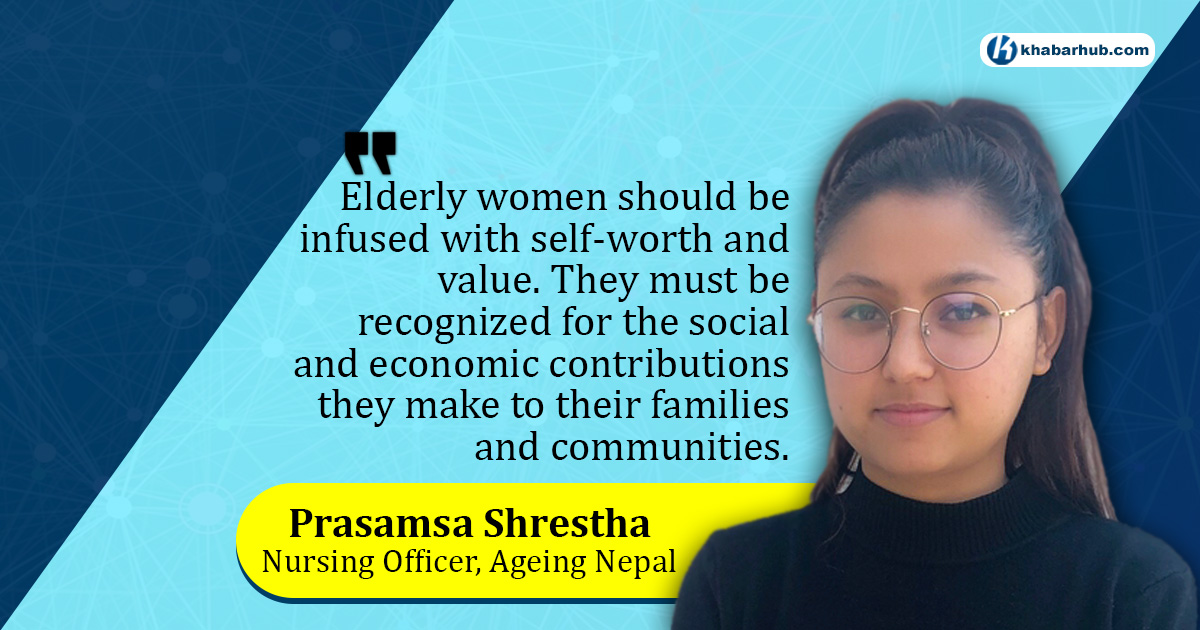0%
They should be treated as equals to their male counterparts throughout their lives in order to develop a healthy society.

International and non-government organizations (I/NGOs) as well as women activists have been raising their voices on women’s rights in recent years. While such initiatives have been focused on young girls and women, the plights of elderly women remains largely unaddressed. This write up discusses how elderly women are deprived of much needed rights with some examples.
Santoshi, a single woman of 75 lives with her son, daughter-in law and her grandchildren. Santoshi says, “My family compels me to stay indoors because of my age. They consider it a serious case to send me out of the house. My family members say I might get hurt. Moreover, I have a habit of forgetting things and places. They think I cannot learn. Why? Because my age is not appropriate for learning?”
Gautam is one of the 30 students in BLC for elderly persons (60+) set up in 2016 by Ageing Nepal, a non-government organization. Now, it is running smoothly in four places. Three classes are now successfully managed by the local government, whereas one continues to run with the support from Ageing Nepal.
There are many elderly women like Santoshi who have faced discrimination throughout their lives. In 1952, illiteracy among 14+age Nepali population was 90 percent for men and 99.4 percent for women (Census 1952-54). Consequently, elderly women have suffered illiteracy in the first half of the 21st century making their life miserable in this modern society.
“Even though they tell me to stay at home, I go out after they both leave for their respective jobs, and my grandson leaves for school. I come back home before they come. I have been doing this for the last one year. I got caught many times. At times, they seized my old age allowance to prevent me from going out on my own. They believe that I should be obeying everything they say but the desire to learn has overridden those orders. That is why I still continue my hide and seek game.”
Right to health is often ignored
Tairan, an elderly woman is a student of Basic Literacy Class (BLC) organized by Asthabhuja Samaj – a local social organization. She cannot see with one of her eyes as her other eye has a limited vision.
Despite this, her desire to learn is commendable. She says, “There are many organizations working for women’s right to health. But they often ignore elderly women. Does a woman cease to remain a woman after 60? What about our health concerns? Earlier, we were discriminated because of our gender and now we are discriminated because of our age.”
Gautam is one of the 30 students in BLC for elderly persons (60+) set up in 2016 by Ageing Nepal, a non-government organization. Now, it is running smoothly in four places. Three classes are now successfully managed by the local government, whereas one continues to run with the support from Ageing Nepal.
The consequences of poor reproductive health manifest at elderly age such as: uterine prolapse, cervical cancer, complications of menopause and so on. Health issues of elderly people remain ignored even though many charity, non-government organizations and health workers seem concerned towards women’s health.
Social protection for elderly women
Sunita, one of the students of BLC was dependent on her husband for her entire life. Now, since he has passed away she finds herself in a difficult situation. Her old age allowance is neither enough to fulfill her basic needs nor adequate to buy medicines. She finds it difficult to read the labels on medicines. This forced her to be enrolled in BLC.
They have equal rights to autonomy, social protection and to advance health directives. Women of all age group must be considered as contributors to the society. They should be treated as equals to their male counterparts throughout their lives in order to develop a healthy society.
In many countries, elderly women often face challenges and discrimination because of their age and gender. Due to high average life expectancy rate of women, elderly women are more likely to become widowed than elderly men and less likely to remarry which makes them more vulnerable. In addition, illiteracy gives them the sense of loss of their identity and disempowerment.
Women face abuse in elderly age
It is often assumed that gender-based violence is only the problems of younger women. But elderly women are also subject to all types of violence, abuse and neglect. A combination of age and sex discrimination is one of the major reasons that put elderly women at high risk of violence.
In Nepal, 130 cases on the abuse of elderly women were reported in 2018 (Year Book of Senior Citizens 2019, Ageing Nepal). Among them, the highest number is of those neglected (84). Similarly, the reported cases of sexual abuse are higher than previous year as 12 elderly women were raped in 2018. Obviously, many rape cases are unreported due to shame, fear and lack of awareness.
Hence, a change is necessary to address the issues of elderly women. They should be freed from the sense of worthless. Instead, they should be infused with self-worth and value. They must be recognized for the social and economic contributions they make to their families and communities. They have equal rights to autonomy, social protection and to advance health directives. Women of all age group must be considered as contributors to the society. They should be treated as equals to their male counterparts throughout their lives in order to develop a healthy society.
(Surnames of the persons mentioned above are avoided to maintain privacy of the concerned persons – author)
Views expressed in this article are the author’s own and do not necessarily reflect Khabarhub’s editorial stance.